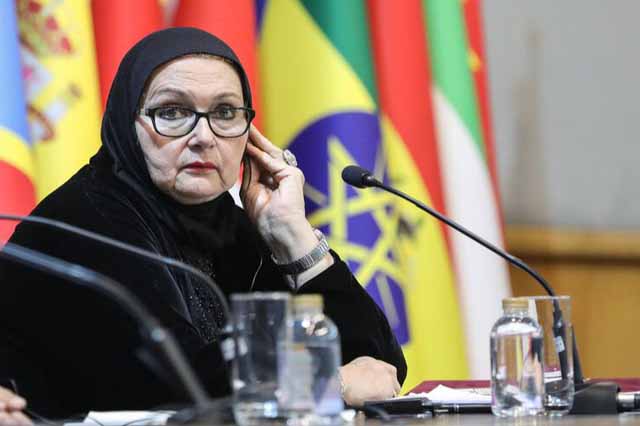 As Zukan Helez, Bosnia’s Minister of Defence, issues a formal apology to the United States for meeting with Iranian officials, one cannot help but notice a peculiar silence surrounding the historic and institutional ties between Iran and Bosnia’s dominant Bosniak party, the SDA (Party of Democratic Action). For decades, the SDA has cultivated relations with Tehran—cultural, religious, and yes, military. Yet Washington has not only tolerated these ties but maintained a largely passive posture as long as these interactions remained discreet. Until now.
As Zukan Helez, Bosnia’s Minister of Defence, issues a formal apology to the United States for meeting with Iranian officials, one cannot help but notice a peculiar silence surrounding the historic and institutional ties between Iran and Bosnia’s dominant Bosniak party, the SDA (Party of Democratic Action). For decades, the SDA has cultivated relations with Tehran—cultural, religious, and yes, military. Yet Washington has not only tolerated these ties but maintained a largely passive posture as long as these interactions remained discreet. Until now.
The question looms: Is this sudden backlash against Helez merely about protocol, or does it signal a shift in American foreign policy under a potential Trump administration? Could we be witnessing a recalibration that finally recognizes the deep, often glossed-over connections between Bosniak leadership and Islamist networks?
A History the West Forgot
Let’s remember: Bosnia’s Islamist infrastructure did not begin with ISIS or the post-9/11 security discourse. It began in the 1990s, when foreign mujahideen fighters were welcomed into Bosnia during the war—with the support of Iran, Pakistan, and other states. The SDA was at the center of this, and its intelligence wing was involved in issuing Bosnian passports to wanted jihadists, including members of Al Qaeda.
Among them: Osama bin Laden—who, according to credible sources, held a Bosnian passport in the 1990s. There’s also Abu Meali, a Bosnian citizen believed to have left the U.S. the day after the 9/11 attacks, never to return. And it is no coincidence that four individuals involved in the 9/11 attacks had connections to the Bosnian conflict and its networks.
The Helez Affair: A Useful Smokescreen?
Helez, a social-democratic politician and not an Islamist, met with an Iranian military attaché in what his ministry described as a routine diplomatic event. Yet, the reaction was swift and unambiguous—pressure from the U.S. Embassy, statements of “concern,” and, ultimately, a public apology.
So why now? Why Helez? And why the silence for decades when the SDA maintained far more dangerous and ideologically grounded connections with the Iranian regime?
The Trump Factor
One plausible answer is that this is a prelude to a shift in U.S. foreign policy under Trump. The previous Trump administration was notoriously hostile to Iran, and its second act may be even more uncompromising.
What if this time, the Trump camp does not distinguish between moderate and radical Bosniak politicians? What if the SDA is finally listed as a problematic entity—a party with a long and irreparable record of Islamist ties?
Could Trump’s State Department finally acknowledge the implications of:
- The Bosnian passport network for global jihadism?
- The infiltration of foreign fighters through Bosnia’s wartime and postwar structures?
- The ideological training camps in central Bosnia that predated global terror networks?
Hidden Files: Abu Meali and Sakib Mahmuljin
One of the most damning episodes in Bosnia’s postwar Islamist entanglement is the case of Abu Meali. Known by several aliases, Meali was Al Qaeda’s chief operative for Europe. In 2001, just before the 9/11 attacks, he was sent to New York as a military attaché to the UN, traveling with a falsified Bosnian passport issued through SDA-controlled networks.

The day after the Twin Towers fell, Meali quietly left the U.S., resurfacing briefly in Vienna before disappearing. His name reemerged when an indictment was filed against Sakib Mahmuljin, the wartime commander of the El-Mujahid unit. Abu Meali served under him. Just as Mahmuljin’s case gained attention, Meali mysteriously died, under circumstances that remain unexplained.
This chain of events reflects how deeply embedded jihadist structures were in Bosnia’s wartime military—and how little scrutiny they have received from the West.
Legal Consequences for the SDA?
If the Trump administration opts for a more aggressive approach, legal tools already exist to treat the SDA not just as a political party but as a facilitator of global terrorism.
Potential U.S. actions include:
- Applying the Foreign Terrorist Organization (FTO) designation.
- Utilizing the Magnitsky Act to sanction individuals for covering up war crimes.
- Invoking the PATRIOT Act for aiding Al Qaeda or affiliated networks.
Under such a policy, the SDA could find itself listed alongside groups in Yemen, Pakistan, or Iraq—entities it once cooperated with directly or indirectly.

What This Means for Bosnia
If Washington begins to draw clear lines, the SDA may no longer be the untouchable pillar of the Bosniak political establishment. A Trump administration could:
- Suspend or condition U.S. military training for the Bosnian Armed Forces, whose lineage traces back to the ARBiH—the army that hosted foreign jihadists.
- Blacklist individuals or organizations connected to wartime radical networks.
- Demand an audit of foreign funding into Islamic NGOs and political channels in Bosnia.
Conclusion: A Reckoning, Long Overdue

Zukan Helez’s apology might mark a symbolic turning point—not because he crossed a line, but because the line itself is being redrawn.
The West’s inconsistent approach to Bosnia has long enabled dangerous ambivalence. If the Trump doctrine prevails, the era of selective blindness may come to an end. And when that happens, the SDA’s long-cultivated image of “moderate Islamism” may finally face its reckoning.